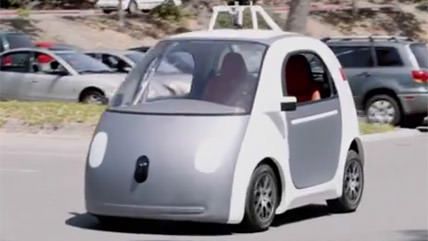Do Self-Driving Cars Make Speed Limits Obsolete?

It's a question without a definitive answer just yet, but if the super-nerds at Google are to be trusted, we may soon be better off without speed limits.
This week Reuters took a ride in one of the Internet giant's hands-free whips, and talked to some researchers:
There wasn't any speeding even though, ironically, Google's engineers have determined that speeding actually is safer than going the speed limit in some circumstances.
"Thousands and thousands of people are killed in car accidents every year," said Dmitri Dolgov, the project's boyish Russian-born lead software engineer, who now is a U.S. citizen, describing his sense of mission. "This could change that." …
Google's driverless car is programmed to stay within the speed limit, mostly. Research shows that sticking to the speed limit when other cars are going much faster actually can be dangerous, Dolgov says, so its autonomous car can go up to 10 mph above the speed limit when traffic conditions warrant.
So, when do we start uprooting those black-and-white signs and let our hair fly free in the autonomous automobiles? That isn't certain yet, either. Although Google cars, according to the BBC, "have travelled on more than 700,000 miles of open road," and the company unveiled a pedal-free, steering-wheel-free vehicle in May, there is no release date yet.
Although speed limits seem like common sense, this eventual proliferation of safe, self-driving cars could prove them to be just another outdated regulation. Since technology changes and improves at such a rapid pace, laws trying to regulate it are often obsolete by the time the ink dries. Even if they were well-intentioned, they end up acting like an anchor on further improvements and can even become dangerous impediments.
Countless reports have documented that red light and speed cameras are counterproductive, making roads more dangerous. http://photoradarscam.com/lesssafe.php
The same goes for cellphone and texting bans, which have demonstrated themselves to be either ineffective or outright counterproductive.
The less the better works on larger scales, too. In the last few years, several towns in Germany, the Netherlands, and the U.K. have done away with just about everything – traffic lights, bike lanes, stop signs, sidewalks – and the results are good. Having in a sense deregulated the roads, people have become more attentive, fatalities declined, and congestion has been dramatically reduced.


Show Comments (31)